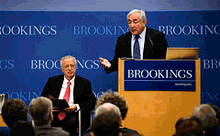
Typical street scene in Santa Ana, El Salvador. (Photo: iStock)
IMF Survey: Jobs Crisis Casts Shadow Over Global Recovery
April 14, 2011
- Think tank event sees employment, equity as building blocks of stability
- Many people face social crisis just as serious as financial crisis
- Social safety nets, progressive taxation can dampen inequality
The jobs crisis is casting a shadow over the global recovery, raising concerns that persistent inequality can stand in the way of sustainable growth, IMF Managing Director Dominique Strauss-Kahn told a Washington think tank.

”While recovery is here, growth—at least in the advanced economies—is not creating jobs,” IMF’s Strauss-Kahn told think tank (photo: Frances Roberts/Newscom)
RECOVERY AND EMPLOYMENT
Speaking on April 13 at the Brookings Institution alongside Sharan Burrow, General Secretary of the International Trade Union Confederation (ITUC), Strauss-Kahn said that “while recovery is here, growth—at least in the advanced economies—is not creating jobs and is not being shared broadly. Many people in many countries are facing a social crisis that is every bit as serious as the financial crisis.”
What is needed, he said, is “a recovery that is sustainable and balanced among countries, but also one that brings employment and fair distribution.”
Cooperation milestone
The Brookings event, held on the eve of the 2011 IMF–World Bank Spring Meetings, represented a milestone in a nearly four-year effort by the IMF and ITUC to strengthen their cooperation on labor market issues. This effort accelerated in the wake of the 2008 financial crisis as the IMF increasingly began to focus on the severe job loss that accompanied the resulting deep recession.
“The greatest risk now is the unresolved crisis of unemployment and inequity,” Burrow said in her speech. “Unemployment stands currently at over 205 million worldwide, its highest-ever recorded level—and even that is a significant underestimate of its true depth since many millions of people seeking work, particularly women, are not registered.”
Other participants in the Brookings event were George Akerlof, Professor of Economics at the University of California at Berkeley and the 2001 Nobel Prize winner in Economics, and Stephen Pursey, Senior Advisor to the Director-General of the International Labour Organization (ILO). In his remarks, Akerlof underlined the importance of continuing to address the jobs crisis, as it is “a question of human dignity.”

Panelists Dominique Strauss-Kahn (r), George Akerlof address Brookings Institution event on global jobs crisis (IMF photo)
The involvement of the ILO pointed to another area in which the IMF has broadened its institutional cooperation in response to the steep rise of unemployment. In September 2010, the IMF and ILO collaborated on a major conference in Oslo aimed at highlighting the linkages between growth, employment, and social cohesion. That conference—which brought together government leaders, labor unions, employers and academics—produced an agreement to broaden cooperation between the two organizations.
The IMF and ILO subsequently have been working together to better understand the policies behind job-creating growth; support social partnership consultations between labor, employers and the government in three countries—Bulgaria, the Dominican Republic, and Zambia; and define policies for building effective social protection floors in low-income countries. Strauss-Kahn is scheduled to address the ILO’s International Labour conference in Geneva in June.
Inequality and growth
The relationship of inequality and economic growth recently has become a focus of research at the IMF. For example, a recent IMF Staff Discussion Note focused on the relationship between inequality and unsustainable growth. In a post to the iMFdirect blog, the authors argued that “(i)t is a big mistake to separate analyses of growth and income distribution. A rising tide is still critical to lifting all boats. The implication of our analysis is that helping to raise the lowest boats may actually help to keep the tide rising!”
Strauss-Kahn, in his Brookings speech, offered broad policy recommendations that could address inequality: “Strong social safety nets combined with progressive taxation can dampen market-driven inequality. Investment in health and education is critical. Collective bargaining rights are important, especially in an environment of stagnating real wages. Social partnership is a useful framework, as it allows both the growth gains and adjustment pains to be shared fairly.”
He added: “Ultimately, employment and equity are building blocks of economic stability and prosperity, of political stability and peace. This goes to the heart of the IMF’s mandate. It must be placed at the heart of the policy agenda.”







